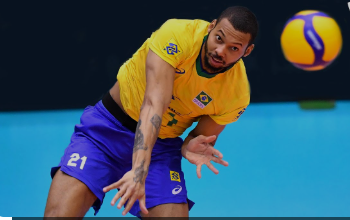The Libido as the Ace Player in Volleyball: Unveiling the Connection Between Passion, Performance, and Athleticism
In the world of sports, success often hinges on a combination of physical prowess, mental focus, and emotional energy. While players’ athletic abilities and technical skills are critical, there is one often-overlooked factor that can influence an athlete’s performance: libido. In volleyball, a fast-paced, dynamic sport that demands explosive power, agility, and endurance, an athlete’s libido—their physical and emotional drive—can play a surprising yet significant role in their overall performance. So, how does libido factor into a volleyball player’s ability to excel on the court, and can it truly be considered an “ace player”?
Understanding Libido in the Context of Athletics
Libido, typically associated with sexual desire, is fundamentally tied to a person’s overall health, energy levels, and emotional state. It is an extension of the body’s internal balance of hormones, mental well-being, and physical fitness. In athletics, libido is not just about sexual desire—it can be a reflection of one’s motivation, competitive drive, and willingness to push the body to its limits. Athletes with a healthy libido often exhibit higher levels of energy, enthusiasm, and focus, which are essential qualities for excelling in sports like volleyball.
Libido and Motivation: The Emotional Connection
Volleyball, like any sport, requires a high degree of mental and emotional engagement. Players must be focused, alert, and able to channel their emotions constructively. A player’s libido is closely linked to their emotional state and motivation. When an athlete feels physically balanced and emotionally charged, they are more likely to approach the game with passion and vigor.
This surge in energy can lead to improved performance in key moments—whether it’s executing a powerful spike, diving for a difficult save, or maintaining focus during a tense rally. In volleyball, where precision, timing, and motivation are critical, libido can act as the invisible fuel that propels players to bring their best to every match. The passion or drive often associated with libido mirrors the desire to win, the urgency of competition, and the thrill of showcasing athleticism.
The Role of Hormones in Libido and Athletic Performance
The connection between libido and volleyball performance goes beyond just psychological factors—it is deeply rooted in biology. Testosterone, the primary male hormone that influences libido, also plays a significant role in muscle growth, strength, and endurance. Female athletes also benefit from hormonal balance that supports libido, such as estrogen and progesterone, which can contribute to their physical energy and resilience.
In both men and women, libido is regulated by hormonal cycles that are influenced by factors like stress, fatigue, diet, and physical activity. Volleyball players with optimal hormonal levels are typically able to perform at their best because their bodies are better equipped to handle the demands of the game, recover from intense sessions, and maintain consistent energy levels. The synergy between a healthy libido and hormonal balance can therefore boost both performance and resilience on the court.
Libido and Team Dynamics: Building Chemistry and Cohesion
Volleyball is a team sport that requires seamless coordination and trust between players. Team chemistry plays a significant role in how well players communicate, move in unison, and anticipate one another’s actions. Here, libido—or more broadly, the emotional drive—can impact team cohesion. Athletes with higher levels of energy and enthusiasm can inspire their teammates, creating a more motivated and connected group.
While libido is a personal and individual experience, it’s also influenced by the collective energy of the team. Teams with players who exhibit emotional drive, intensity, and passion tend to have a contagious effect on their teammates. This camaraderie and shared energy can elevate the performance of the entire team, making libido a subtle but powerful factor in team dynamics. Players who feel emotionally charged and supported by their teammates are often more confident and effective in their individual roles, whether as an attacker, setter, blocker, or libero.
The Libido-Performance Paradox: When Too Much or Too Little Affects the Game
Like any aspect of physical or mental performance, balance is key. A too-high libido, if unchecked, may translate into excess energy that leads to overexcitement, distraction, or an inability to focus. On the other hand, a low libido, which might reflect fatigue, stress, or emotional disengagement, could result in lackluster performances, lower motivation, and poor physical output.
In the context of volleyball, managing libido and its connection to performance is important for long-term success. Players must learn how to channel their emotional and physical energy effectively, using their libido as a motivator without letting it interfere with their focus. Coaches and athletes need to find a balance between keeping energy levels high and ensuring mental clarity—recognizing that libido is both a source of power and a potential distraction.
The Impact of Off-Court Lifestyle on Libido and Volleyball Performance
Lifestyle choices off the court play a major role in an athlete’s libido and overall performance. Diet, exercise, sleep patterns, stress levels, and emotional well-being all directly affect hormonal balance and, by extension, libido. Athletes who take care of their physical health and mental state through adequate nutrition, recovery, and mindfulness practices often find that their libido is positively impacted, resulting in heightened performance during games.
Moreover, interpersonal relationships, self-esteem, and confidence are also linked to libido. Players who feel fulfilled and emotionally healthy outside of the sport are more likely to bring a positive energy to their game, fostering better performance both individually and as part of a team.
Conclusion: Libido as a Secret Weapon in Volleyball
While it may seem surprising to think of libido as an “ace player” in volleyball, it is clear that a healthy libido can greatly influence an athlete’s performance. It is not just about physical desire but about emotional drive, motivation, and energy—critical components for success in a sport that demands passion, focus, and explosive physicality.
Whether it’s the boost of energy from balanced hormones, the emotional connection with teammates, or the mental drive to outperform, libido is intricately linked to the success of a volleyball player. By recognizing the impact of libido on both individual and team performance, athletes can harness this natural force to elevate their game. After all, in volleyball, as in life, success often begins with the passion to strive for greatness.







